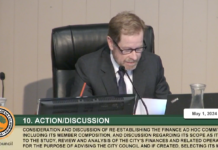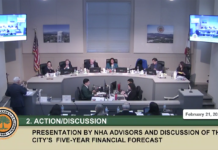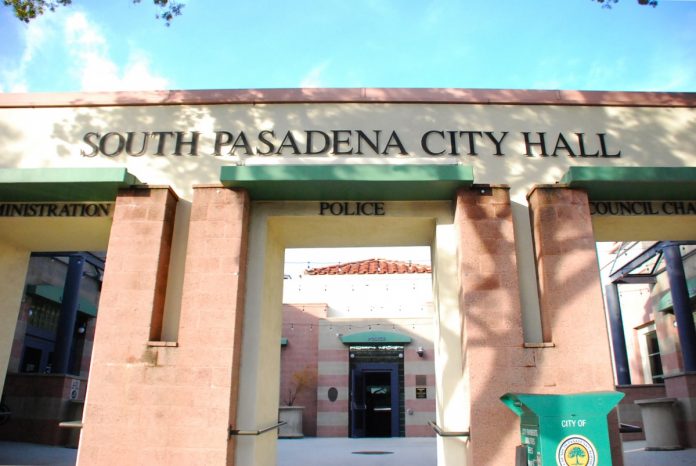The South Pasadena City Council on Wednesday evening is set to adopt its first-ever Climate Action Plan (CAP). The plan reviews the city’s 2016 baseline Greenhouse Gas (GHG) inventory; sets emission reduction targets; lists specific strategies and steps to reach those targets; suggests a multi-pronged funding strategy; and introduces an implementation monitoring mechanism.
The CAP, which along with its associated environmental review determination total nearly 500 pages, was approved by the Natural Resources and Environmental Commission Oct. 27.
To meet its share of the State target, South Pasadena will have to reduce its GHG use by the equivalent of 18,578 metric ton of CO2 by 2030; 53,874 MT by 2040; and 73,969 MT by 2045.
One MT of CO2, according to the report, is the equivalent of burning 113 gallons of gasoline, or driving about 2,500 miles.
The report states that in 2016, the community of South Pasadena emitted just over 125,000 MT.
According to a city staff memo, “emissions from the transportation sector would be reduced through the reduction of vehicle miles traveled, increased Active Transportation Mode Share, and increased adoption of electric vehicles. Primary emission reductions in the energy sector through 2030 would be attributable to the renewable energy used by the city” through the Clean Power Alliance chaired by Mayor Diana Mahmud. “Additionally, as new buildings are built and existing buildings are retrofitted, further energy emission reductions would be achieved through electrification.”
The CAP states it “will require investments on the part of the City, local households and property owners, and commercial businesses.” The report shows cost estimates for 15 strategies that total $2.23 million, though the report does not explain how the estimates were made or whether they are adjusted for inflation. It offers prospective funding sources (financing, fees, restricted funds, general city funds, grants) for 94 specific steps that fall under each strategy. Although the steps are not broken out by cost, over a third of them are allocated to the city’s General Fund.
In an appendix, the CAP notes that while General Fund money wouldn’t be “restricted by government approval or outside agencies,” it would necessarily impinge on funding for critical city services at a time when covid-19 has already reduced city revenue. This “will make it more difficult to directly fund” some of the CAP’s actions.
Also Wednesday, the city is set to approve its monthly bill payments. One of these is a $46,686.74 payment to the city’s law firm, Colantuono, Highsmith & Whatley PC (CHW). At the last City Council meeting, 1st District Council Member Evelyn Zneimer had the item pulled, pending a closed session she requested to review the performance of the law firm, which has had a contract with the city since 2014. District 3 Council Member Jon Primuth seconded pulling the item and District 2 Council Member Jack Donovan seconded adding it the closed session.
The matter is set to be taken up during the one-hour closed session proceeding Wednesday’s open meeting. Zneimer told the South Pasadenan News that depending how that meeting goes, she may again move to pull the payment during the open session. She said she wants CHW to more clearly itemize the legal fees and costs associated with each of the 11 cases the firm is currently handling for the city, something she says it did prior to the tenure of the recently departed city manager.
Under an amendment approved last year, CHW is paid a monthly retainer of $10,000 for approximately 50 to 52 hours of general services. But “special projects” requiring over 10 hours of work, litigation services, and “other specialized legal services” are billed by the hourly rate of the specialist assigned, up to $245/hour. The most recent bill includes separate charges for: general services; covid-19; “case 2”; 710 issues; labor & employment; miscellaneous litigation; special projects; and water & utilities. “Case 2” and special projects represent two thirds of the entire bill.
“No one knows how much the city is spending for legal costs,” Zneimer said. She is also concerned about the city’s legal performance, citing in particular a case involving a former police officer who won a multi-million award that the city unsuccessfully appealed. Zneimer said the case should not have been appealed.
The city is also set to:
— Approve a $200,000 allocation of Prop C money for a traffic study on alternative modifications to the State Route 110 and Fair Oaks interchange (the “loop ramp”). The study will be monitored by a subcommittee of the city’s Mobility and Transportation Infrastructure Commission, and its scope must include projects that were developed by the former Public Works, Freeway and Transportation Commission and approved by the City Council in 2017.
— Appoint two of its members, who will in turn appoint two members of the Natural Resource and Environmental Commission, to serve on an ad hoc committee to support Public Works Department staff during the negotiation of an amendment to the city’s exclusive franchise agreement with Arakelian Enterprises (dba Athens Services) for the collection, transportation and disposal of refuse and recyclable materials. The action is being taken because Athens is looking to increase its rates due to an increase in the state’s target for reducing the disposal of organic waste and because wood waste and yard trimmings used to cover landfills no longer count toward a city’s diversion of recyclable material.
— Continue a hearing on a 10-and-a-half-month extension to the moratorium adopted Nov. 4 on evictions based on unpermitted substantial remodels.
— Approve a $570,999.84 lease purchase deal with Motorola Solutions Inc. to purchase a computer aided dispatch and records management system for the police department. The cost will be covered by a state grant funded by the state vehicle licensing fee. The 15-year-old existing software is badly outdated, according to a staff memo.
— Approve $93,000 for capital improvements to the city-owned San Pascual Stables.
— Join a trend set by the American Library Association and some regional libraries to eliminate the city library’s overdue material fee. Overdue material fees “disproportionately impact families and individuals with limited resources,” a staff report explained.
— Adopt a resolution continuing the Local Emergency regulations adopted March 18 due to the Covid-19 outbreak. The extension adopts an expansion of the Al Fresco dining and retail program and county rules limiting third-party food delivery and take-out. It is the fourth time the city has extended or amended the local emergency proclamation.
















.png)









